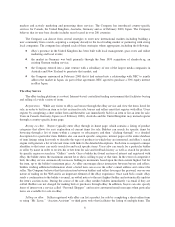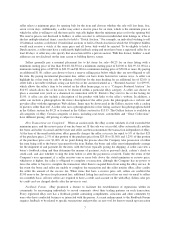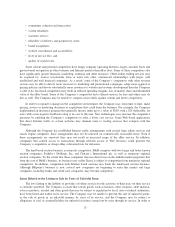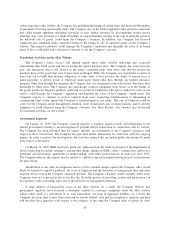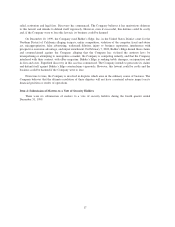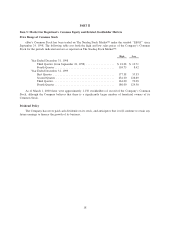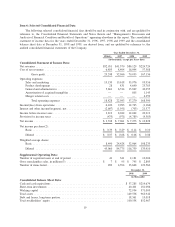eBay 1999 Annual Report Download - page 21
Download and view the complete annual report
Please find page 21 of the 1999 eBay annual report below. You can navigate through the pages in the report by either clicking on the pages listed below, or by using the keyword search tool below to find specific information within the annual report.applicability of the California regulations to the Company’s business to date and little precedent exists in this
area. Several states are considering imposing these regulations upon the Company or its users, which could harm
the business. In addition, as the nature of the products listed by the Company’s users change, eBay may become
subject to new regulatory restrictions.
Several states have proposed legislation that would limit the uses of personal user information gathered
online or require online services to establish privacy policies. The Federal Trade Commission also has recently
settled proceedings regarding the manner in which personal information is collected from users and provided to
third parties. Changes to existing laws or the passage of new laws intended to address these issues could directly
affect the way the Company does business or could create uncertainty in the marketplace. This could reduce
demand for the Company’s services, increase the cost of doing business as a result of litigation costs or increased
service delivery costs, or otherwise harm the business. In addition, because the Company’s services are accessible
worldwide, and facilitate sales of goods to users worldwide, foreign jurisdictions may claim that the Company is
required to comply with their laws. As the Company expands its international activities, it will become obligated
to comply with the laws of the countries in which the Company operates. Compliance may be more costly or
may require the Company to change its business practices or restrict service offerings relative to those in the
United States. The Company’s failure to comply with foreign laws could subject the Company to penalties
ranging from fines to bans on its services.
Item 2: Properties
On March 1, 2000, the Company entered into a five-year lease for general office facilities located in
San Jose, California. Payment under this lease, which commenced during 2000, are based on the London
Interbank Offering Rate (‘‘LIBOR’’) plus 0.394% applied to the $126.4 million cost of the facility funded by the
lessor. The Company has an option to renew the lease for up to two five-year extensions subject to specific
conditions. Under the terms of the lease agreement, the Company was required to place $126.4 million of cash
and investment securities as collateral for the term of the lease. The cash and investment securities are restricted
as to their withdrawal from the third party trustee.
The Online segment leases 72,000 square feet in Utah that is primarily used as a customer call center. Office
space for the Online segment’s international subsidiaries is leased in Australia, England, Germany, Japan and
Switzerland.
The Offline segment owns facilities in California and Indiana with an aggregate of approximately
750,000 square feet. Of the 750,000 square feet, the Company is a majority interest holder in 343,000 total square
feet of office space and the sole owner of the remaining balance.
The Company believes that its existing facilities are adequate to meet its needs for the immediate future
and future growth can be accommodated by leasing additional or alternative space.
Item 3: Legal Proceedings
On March 23, 1999, the Company was sued by Network Engineering Software, Inc. (‘‘NES’’) in the U.S.
District Court for the Northern District of California for its alleged willful and deliberate violation of a patent.
The suit sought unspecified monetary damages as well as an injunction against the Company’s operations. It also
sought treble damages and attorneys’ fees and costs. The Company has entered into a settlement agreement and
license with NES, and this suit has been dismissed with prejudice.
On September 1, 1999, the Company was served with a lawsuit filed by Randall Stoner, on behalf of the
general public, in San Francisco Superior Court (No. 305666). The lawsuit alleges that the Company violated
Section 17200 of the California Business & Professions Code, a statute that relates to unfair competition, based
upon the listing of ‘‘bootleg’’ or ‘‘pirate’’ recordings by the Company’s users, allegedly in violation of California
penal statutes relating to the sale of unauthorized audio recordings. The lawsuit seeks declaratory and injunctive
16


